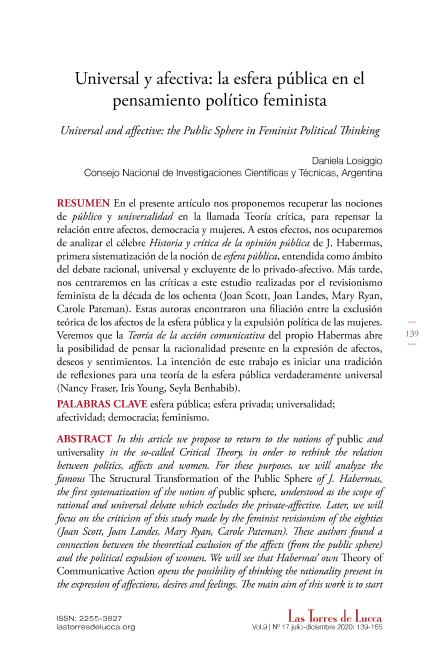Mostrar el registro sencillo del ítem
dc.contributor.author
Losiggio, Daniela

dc.date.available
2022-09-21T15:28:55Z
dc.date.issued
2020-07
dc.identifier.citation
Losiggio, Daniela; Universal y afectiva: la esfera pública en el pensamiento político feminista; Universidad Complutense de Madrid; Las Torres de Lucca; 9; 17; 7-2020; 139-165
dc.identifier.uri
http://hdl.handle.net/11336/169751
dc.description.abstract
En el presente artículo nos proponemos recuperar las nociones de público y universalidad en la llamada Teoría crítica, para repensar la relación entre afectos, democracia y mujeres. A estos efectos, nos ocuparemos de analizar el célebre Historia y crítica de la opinión pública de J. Habermas, primera sistematización de la noción de esfera pública, entendida como ámbito del debate racional, universal y excluyente de lo privado-afectivo. Más tarde, nos centraremos en las críticas a este estudio realizadas por el revisionismo feminista de la década de los ochenta (Joan Scott, Joan Landes, Mary Ryan, Carole Pateman). Estas autoras encontraron una filiación entre la exclusión teórica de los afectos de la esfera pública y la expulsión política de las mujeres. Veremos que la Teoría de la acción comunicativa del propio Habermas abre la posibilidad de pensar la racionalidad presente en la expresión de afectos, deseos y sentimientos. La intención de este trabajo es iniciar una tradición de reflexiones para una teoría de la esfera pública verdaderamente universal (Nancy Fraser, Iris Young, Seyla Benhabib).
dc.description.abstract
In this article we propose to return to the notions of public and universality in the so-called Critical Theory, in order to rethink the relation between politics, affects and women. For these purposes, we will analyze the famous The Structural Transformation of the Public Sphere of J. Habermas, the first systematization of the notion of public sphere, understood as the scope of rational and universal debate which excludes the private-affective. Later, we will focus on the criticism of this study made by the feminist revisionism of the eighties (Joan Scott, Joan Landes, Mary Ryan, Carole Pateman). These authors found a connection between the theoretical exclusion of the affects (from the public sphere) and the political expulsion of women. We will see that Habermas’ own Theory of Communicative Action opens the possibility of thinking the rationality present in the expression of affections, desires and feelings. The main aim of this work is to start a tradition of reflections for a truly universal public sphere theory (Nancy Fraser, Iris Young, Seyla Benhabib).
dc.format
application/pdf
dc.language.iso
spa
dc.publisher
Universidad Complutense de Madrid

dc.rights
info:eu-repo/semantics/openAccess
dc.rights.uri
https://creativecommons.org/licenses/by/2.5/ar/
dc.subject
ESFERA PÚBLICA
dc.subject
ESFERA PRIVADA
dc.subject
UNIVERSALIDAD
dc.subject
AFECTIVIDAD
dc.subject
DEMOCRACIA
dc.subject
FEMINISMO
dc.subject.classification
Ciencia Política

dc.subject.classification
Ciencia Política

dc.subject.classification
CIENCIAS SOCIALES

dc.title
Universal y afectiva: la esfera pública en el pensamiento político feminista
dc.title
Universal and affective: the Public Sphere in Feminist Political Thinking
dc.type
info:eu-repo/semantics/article
dc.type
info:ar-repo/semantics/artículo
dc.type
info:eu-repo/semantics/publishedVersion
dc.date.updated
2022-09-19T20:38:20Z
dc.identifier.eissn
2255-3827
dc.journal.volume
9
dc.journal.number
17
dc.journal.pagination
139-165
dc.journal.pais
España

dc.journal.ciudad
Madrid
dc.description.fil
Fil: Losiggio, Daniela. Consejo Nacional de Investigaciones Científicas y Técnicas; Argentina. Universidad Nacional de General Sarmiento. Instituto del Desarrollo Humano; Argentina
dc.journal.title
Las Torres de Lucca
dc.relation.alternativeid
info:eu-repo/semantics/altIdentifier/url/https://revistas.ucm.es/index.php/LTDL/article/view/75155
Archivos asociados
